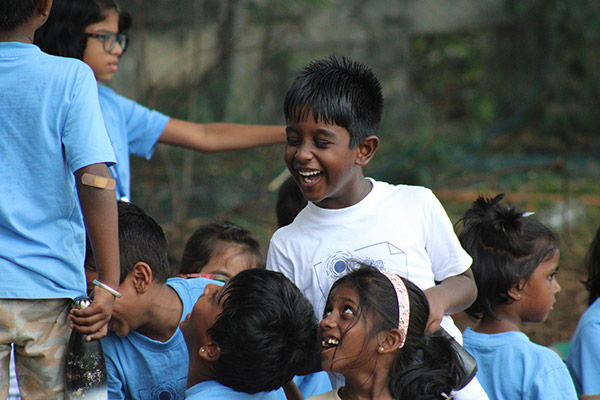Cultivating a culture of Mindfulness through Nature
- Chettinad - Sarvalokaa Education

- Mar 29, 2021
- 4 min read
Updated: Dec 18, 2025
Contributed by: Saran Kaur, Academic Coordinator
“Nature does not hurry, yet everything is accomplished” - Lao Tzu
Isn't it thought provoking? Ultimately all one wants is to feel accomplished and cultivate a sense of well-being. Nature, just like the quote suggests, has a treasure of wisdom to discover and learn many valuable life lessons.
As adults, we do learn, develop habits of the mind through experience, trial and error in life. Yet, what if an opportunity is given to learn the art of mindfulness at a young age, in an environment that is all natural to help open these gates of wisdom? Let us do a simple exercise...
Close your eyes and imagine yourself near a waterfall, all you can hear is the swishing water on the rocks, all you see is the sight of colorful fishes gliding in the crystal clear waters! And when you take a deep breath, you smell the petrichor.
How would you feel?
A sense of calmness and gratefulness comes in automatically, one wishes to just stand there and be in the present, to feel the most of it. A sense of wonder and curiosity creeps into our mind, thinking how the water came into the fall or perhaps develops a willingness to know more about the fish that is in the water and a lot more...
Similarly, giving children an opportunity to be in Nature, provokes many deep thoughts and a sense of inquiry which is unique to every individual. As they spend time outdoors, they take the opportunity to look into every small details present around them with wonder! It inculcates self-regulation and abstract thinking skills naturally.
Give a child some sticks, twigs or leaves and ask him/her to create a piece of art, you will be astonished at the results! With nature, just the way it is, imperfectly perfect, has the power to shape young minds fantastically!
Yet, the challenge remains in today’s fast-paced life, how do we cultivate a sense of natural curiosity and most importantly make time to be in the nature?
Well, the answer is, to “create the environment” at home and habits that mindfully lead towards it.
Here are a few engagements that can be easily done at home with your child at your time and space:
Composting waste - let us help our children understand why composting is important and that it is a way to help save our environment of the tons of waste that is produced every day. Let us develop empathy towards the planet that has given us innumerable things to be grateful for.
Creating a kitchen garden - whether our space is big or small, we can always customise and create a kitchen garden full of herbs that we can use in our food everyday. Having our children involved from the very first to the daily steps of watering the aromatic herbs and plucking them with care, to adding them to our food that takes the taste and the smell to an another level is something that will surely give you and your child a sense of wonder and inclination towards planting more!
Sunday nature scavenger hunts: Having a lovely Sunday morning spent in the nearby park, garden or any natural area nearby observing, collecting and looking for unique natural items in the nature can be a good way of connecting, exploring and giving the children an opportunity to develop their own relationship with the natural environment.
Natural Trail-Rail: Every two weeks find a new book to read as a family on nature and create a railway of books. See where the railway leads you every month and write a reflection together at the end of the month at your imaginary station! This way you develop a habit of reading as a family, children gain insight not only into the natural world but also develop the much needed vocabulary. Soon, it will be ritual that your family will look forward to for sure!
Natural Inquiry corner at home: Create an inquiry station at home, use all natural objects - seeds from the kitchen, natural dyes out of turmeric, beetroot or cabbage, twigs, peels - research with your child what can you do with those, what are their uses/values, explore a new concept every week together! Draw or craft with those and give a form to your imagination!
Nursery visits or picnics - The choice is yours! Once a month indulge into the old school style of going out as a family with home-made food and snacks to have a picnic outdoors or visit a nursery with your child to see and explore some different varieties of plants.
Keep a nature journal: Having a nature journal and writing/drawing after every experience can help us build a strong culture of reflection and develop a habit of expression on paper. Nature impacts us in many ways, journaling the experiences can be a memory to treasure!
A lot can be done when you are in the right space, mentally and physically! Join us at Chettinad - Sarvalokaa Education, International School that believes in the power of nature and its positive impact on learners of all ages. Set on a 10-acre campus with state-of-the-art facilities situated within the lush green 108-acre Chettinad Health City in OMR Kelambakkam, Chennai. Sarvalokaa is an IGCSE Cambridge (Waldorf) School with day-school and week-boarding facilities. Through the school we aim to develop individuals who are creative, collaborative, adaptable and resilient. Our humanistic approach empowers students to discover the joy of learning, embrace challenge and use earth’s resources mindfully.







Comments